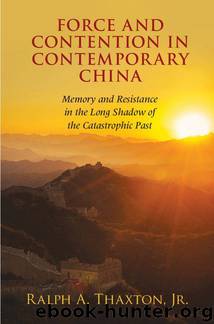Force and Contention in Contemporary China: Memory and Resistance in the Long Shadow of the Catastrophic Past (Cambridge Studies in Contentious Politics) by Thaxton Jr Ralph A

Author:Thaxton, Jr, Ralph A.
Language: eng
Format: mobi
Publisher: Cambridge University Press
Published: 2016-05-30T16:00:00+00:00
7
The Defeat of the Democratic Experiment and Its Consequences
Facing a continuing legitimacy crisis in the deep countryside, on November 24, 1987, the Deng Xiaoping–led Central government passed the provisional Organic Law on Village Committees, which mandated the formation of new bodies of local government through democratic procedures in China’s 900,000-plus villages. Subsequently, the Ministry of Civil Affairs (MCA) set out to promote the democratic elections of Village Committees, the purpose of which was to liberate villagers from the coercive rule of Mao-era vigilantism and, according to Kevin J. O’Brien and Lianjiang Li, to “rejuvenate village leadership by cleaning out incompetent, corrupt, and high-handed cadres, all for the purpose of consolidating the current regime.”1
Working with local government leaders and assisted by both the Carter Center and the Ford Foundation, the MCA attempted to promote several rounds of free and fair village elections in rural China. Between 1988 and 1998, its cadres sought to protect the young experiment in electoral democracy by providing secret voting facilities and legal oversight over violations of electoral procedures.2 Their hopes buoyed by Beijing’s professed support for Village Committees, Western observers concluded that China’s rural people had become weighty actors in the local electoral process, benefiting from a reform that was making village leaders more responsive to a popular electorate.3 Some even claimed the Chinese Communist Party (CCP) had planted the institutional seeds of local freedom.4
The problem with this view was that it was a view from above. It was not rooted in an understanding of how local Communist Party leaders shaped the democratic experiment as it unfolded day by day, election by election on the ground. It presumed that popular support for elections was nurtured primarily by reformers in Beijing and that local party branch leaders were capable of supporting the fundamental principles and procedures underlying electoral democracy. Neither of these assumptions turned out to be true in Da Fo village. Because Da Fo experimented with electoral democracy between 1988 and 1998, we can draw on its history to generate a worm’s-eye view of why elections mattered to villagers, of how contentious the electoral process was, and of the very limited extent to which local party leaders were inclined to endorse core democratic ideas and procedures.
Download
This site does not store any files on its server. We only index and link to content provided by other sites. Please contact the content providers to delete copyright contents if any and email us, we'll remove relevant links or contents immediately.
| Anthropology | Archaeology |
| Philosophy | Politics & Government |
| Social Sciences | Sociology |
| Women's Studies |
The Secret History by Donna Tartt(19053)
The Social Justice Warrior Handbook by Lisa De Pasquale(12187)
Thirteen Reasons Why by Jay Asher(8894)
This Is How You Lose Her by Junot Diaz(6877)
Weapons of Math Destruction by Cathy O'Neil(6267)
Zero to One by Peter Thiel(5789)
Beartown by Fredrik Backman(5737)
The Myth of the Strong Leader by Archie Brown(5500)
The Fire Next Time by James Baldwin(5431)
How Democracies Die by Steven Levitsky & Daniel Ziblatt(5216)
Promise Me, Dad by Joe Biden(5144)
Stone's Rules by Roger Stone(5081)
A Higher Loyalty: Truth, Lies, and Leadership by James Comey(4954)
100 Deadly Skills by Clint Emerson(4921)
Rise and Kill First by Ronen Bergman(4780)
Secrecy World by Jake Bernstein(4741)
The David Icke Guide to the Global Conspiracy (and how to end it) by David Icke(4709)
The Farm by Tom Rob Smith(4502)
The Doomsday Machine by Daniel Ellsberg(4484)
